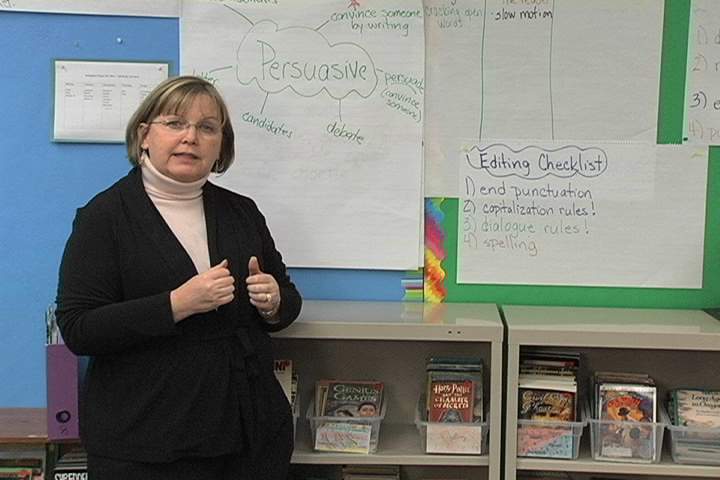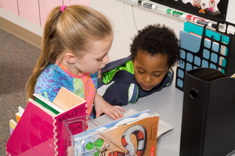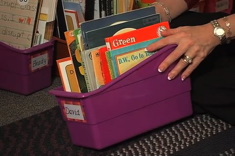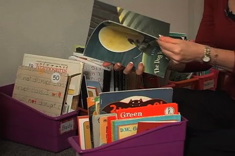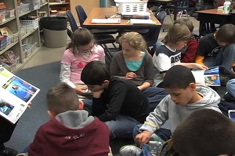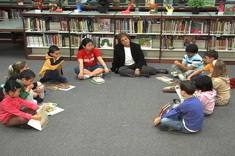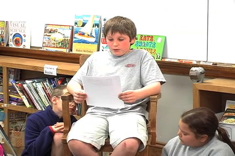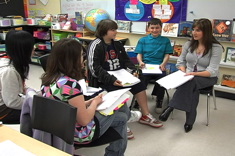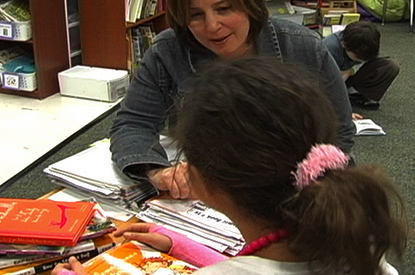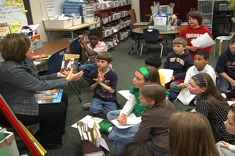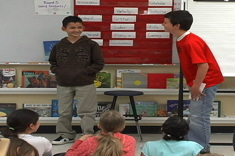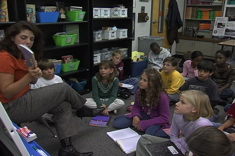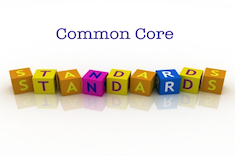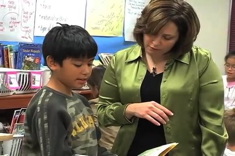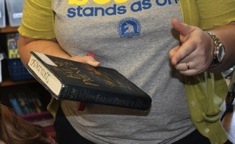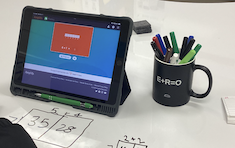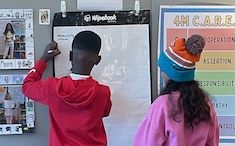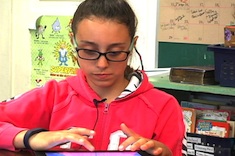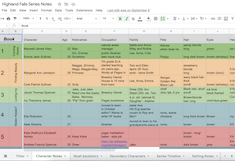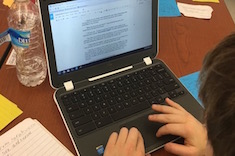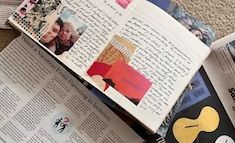5th
Latest Content
5th Grade Room Tour
Karen Terlecky’s classroom tour focuses on the anchor charts and wall displays she uses to promote literacy with her 5th grade students.
Managing Book Boxes
In this first video in our “Organizing Book Boxes” series, Joan Moser (of “The Sisters”) explains three strategies she uses to help students pick books for their book boxes.
Differentiating Book Boxes
In this second video in our "Organizing Book Boxes" series, Joan Moser (of "The Sisters") explains how she differentiates the content of book boxes for students with different skills and needs.
Book Boxes Nuts and Bolts
In this third video in our "Organizing Book Boxes" series, Joan Moser (of "The Sisters") tackles the issue of what types of books and what levels are appropriate for student book boxes.
Main Ideas in Nonfiction
In this whole-class lesson, 5th grade teacher Karen Terlecky and her students consider how main ideas work in nonfiction texts.
Tiger Teams: Mixed Age Student Groups
In this video, Karen Szymusiak (the principal at Glacier Ridge Elementary School in Dublin, Ohio) explains how “Tiger Teams” work. Tiger Teams are mixed age groups of K-5 students who meet regularly to talk about their learning and the school community.
Narrative Nonfiction in Fifth Grade, Part 1
In this lesson from a fifth-grade classroom, Aimee Buckner guides students in a notetaking process to help them understand the qualities of nonfiction narrative writing.
From Compliments to Naming the Craft: Fifth-Grade Writing Workshop Share Session
This whole-class share session in Lesley Fowler’s fifth-grade classroom is the culmination of a nonfiction writing unit. Over the course of the year, students have moved from complimenting their classmates during these share sessions to writing down specific aspects of the piece they enjoyed or had questions about during the reading.
Book Matchmaker: Texts for “Outdoorsy” Boys
Those “outdoorsy” boys who love to fish and four-wheel all summer long can be a challenge to hook with books when they return to classrooms in the fall. This Book Matchmaker feature presents a video preview of new titles to entice these intermediate readers, as well as a print supplement of additional suggestions.
Flexible Grouping: When, How, and Why
Max Brand explains how daily student grouping can be both planned and spontaneous.
Minilessons to Start Conversations with Students About Books
In leadership positions, the first conversations with students about who you are and what you believe can set the tone for the year. Franki Sibberson has helpful advice for talking with readers — big and small.
Hooked on Series: Great Series Books for Transitional Readers
Finding the right series for a transitional reader is a gift. Franki Sibberson shares her favorite finds.
The “All About Us” Board: Linking Literacy and Community Building All Year Long
Suzy Kaback has terrific tips for an ever-evolving “All About Us” bulletin board to use from the first day of school to the last.
Comprehending Graphic Novels: A Primer for Teachers
Mary Lee Hahn provides a quick primer for teachers new to graphic novels, as well as suggestions for using these novels to teach comprehension.
Digging Deep: The Power of Rereading
Max Brand considers how rereading helps students understand and enjoy texts.
Common Core Conversations: Increasing Argumentative Writing
Teachers continue to puzzle over and sort through the terminology in the Common Core related to opinion and persuasive writing. Amanda Adrian and Heather Rader consider terms and teaching strategies.
Whole Class Interviews: Building Community in Writing Workshop (TEMPLATE)
Interviews early in the year are a potent tool for building a class community.
Word Study is More Than Spelling
Franki Sibberson works to expand her views of spelling and word work, redefining routines in her grades 3 and 4 classroom.
A Strategy Lesson for “Drive-Thru” Readers
Who is a “drive-thru” reader? One who zips through the start of a book and discards it before finishing, moving ever more quickly through random books. Aimee Buckner has some minilesson suggestions for dealing with those students who can’t or won’t finish any books they start.
Dot Images: Taking Time to Reflect Brings Out Mathematical Ideas
Mallory Messenger shares a way to help students slow down and reflect on mathematical ideas. As she poses dot images to the class and collects different ways students see and count each image, students begin to reflect on key ideas. Mallory gives questions that will help students develop a stronger understanding of the concepts.
Ready-to-Go Book Talks
Leigh Anne Eck shares the dilemma of many teachers—at the start of a new school year, book talks are easy to keep up with because the fresh reads from the summer are front of mind. But as the year gets busy, it becomes more difficult to keep up, and it’s easy to let book talks fall away. Leigh Anne offers a simple and practical solution to have book talks ready no matter how busy or frazzled you are!
Teaching = Communication
Jodie Bailey reflects on the power and problem of using acronyms to define the order of operations for students. She offers several routines to foster an understanding of mathematical concepts beyond memorizing an acronym.
Giving Kids Time and Space to Show Their Brilliance
Mallory Messenger offers intentional ways to give students time and space to share their learning. This is easier said than done in our fast-paced, standardized-test-driven, mandates-filled world, but with a few intentional strategies, we can slow down the pace just enough to see what our students can really do.
Gratitude Week
Gigi McAllister shares the tradition of Gratitude Week. It gives students an authentic writing experience that has a ripple effect of spreading joy and gratitude throughout the school. It also shows them the significant impact that their words can have on others.
Going Deeper with Math Curricular Materials
Mallory Messenger guides us in taking what our district-adopted math curriculum resources provide and planning small changes by using problem stems and student problem posing to increase the rigor and make mathematical experiences accessible for all students.
Setting Middle School Readers Up for Success
Tara Barnett and Kate Mills share ways to set up middle school readers for a successful independent reading life. Download two reading reflections to help students pause and consider where they are and where they want to go as readers.
Using Fiction Writing to Change Attitudes About Writing
Katherine Sokolowski encourages teachers to take time for students to individualize the writing process and enjoy fiction writing by engaging in National Novel Writing Month. Download the story bible as a place for students to plan their stories.
Managing Independent Projects (SHORTS)
Tara Barnett and Kate Mills continue their series on independent projects with nuts and bolts advice on management.
Writing as an Act of Resistance and a Source of Strength
In this beautiful personal essay, Stella Villalba reminds us that writing is a source of strength, and developing a community of writers is essential in post-pandemic classrooms.
Browse Content By
Type
Category
- Assessment Tools
- Big Fresh Archives
- Booklists
- Choice Numeracy
- Classroom Design
- Common Core
- Community Building
- Conferring
- Content Literacy
- Digital Literacy
- English Language Learners
- Equity
- Family Relations
- Free Samples
- Guiding Groups
- Leadership
- Literacy Coaches
- Mentor Texts
- Minilessons
- New Teacher Mentors
- Podcasts
- Poetry
- Quote Collections
- Reading Strategies
- Self Care
- Struggling and Striving Learners
- Talking and Listening
- Teacher Study Groups
- Teaching Reading
- Teaching Writing
- Word Study and Vocabulary
Author
- Melissa Quimby
- Nawal Qarooni
- Gwen Blumberg
- Julie Cox
- The Lead Learners
- Hannah Tills
- Josie Stewart
- Ruth Metcalfe
- Mallory Messenger
- Becca Burk
- Jodie Bailey
- Vivian Chen
- Mary Brower
- Tiffany Abbott Fuller
- Stephanie Affinito
- Ruth Ayres
- Leigh Anne Eck
- Heather Fisher
- Shari Frost
- Julie Johnson
- Suzy Kaback
- Gigi McAllister
- Shirl McPhillips
- Melanie Meehan
- Cathy Mere
- Debbie Miller
- Tara Barnett and Kate Mills
- Tammy Mulligan
- Dana Murphy
- Bitsy Parks
- David Pittman
- Brenda Power
- Heather Rader
- Matt Renwick
- Mandy Robek
- Christy Rush-Levine
- Gretchen Schroeder
- Jen Schwanke
- Brian Sepe
- Katherine Sokolowski
- Stella Villalba
- Jennifer Vincent
Grade Level
Choice Literacy Membership
Articles
Get full access to all Choice Literacy article content
Videos
Get full access to all Choice Literacy video content
Courses
Access Choice Literacy course curriculum and training

